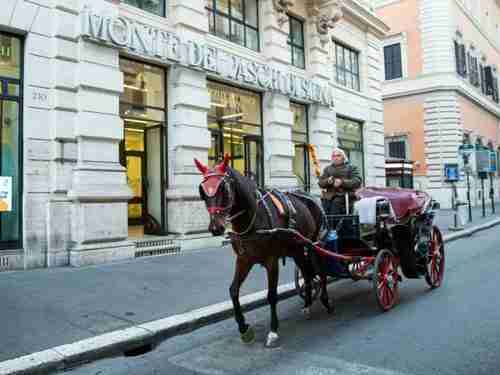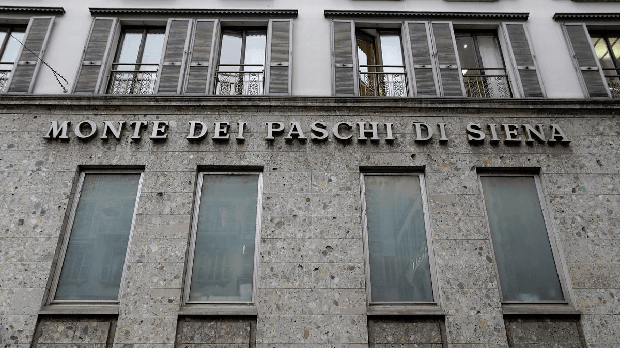This morning’s key headlines from GenerationalDynamics.com
- Bank run worsens Italy’s banking crisis
- Following the money, Sao Tome and Principe switches allegiance from Taiwan to China
Bank run worsens Italy’s banking crisis

A horse-drawn carriage passes a branch of Banca Monte dei Paschi bank in Rome.
A week after Italy’s government announced that it would bail out the failing the Banco Monte dei Paschi di Siena (MPS) bank, with a “bail-in” that would put the life savings of tens of thousands of depositors at risk, the European Central Bank said on Tuesday that MPS’s financial situation is deteriorating far more rapidly than expected.
MPS has €55.2 billion in bad loans. Three weeks ago, MPS said that it had enough funds to stay afloat for 11 months. Then last week, MPS said that it would run out of money within four months.
According to one financial analyst:
“It’s a national tragedy. Monte Paschi survived the Inquisition, the unification of Italy, fascism and two world wars. But it couldn’t survive the mismanagement and corruption of bankers and politicians in the 21st century.”
The government of Italy announced last week that the size of the bailout would be €5 billion, the amount needed to allow MPS to meet its immediate obligations and avoid bankruptcy. However, the ECB said that MPS’s financial position has suffered a “rapid deterioration” during the period from November 30 to December 21, now the €5 billion figure is too small. €8.8 billion will be required to get past the immediate emergency.
It’s believed that the “rapid deterioration” is being caused by run on the bank. It’s known that from June to September of this year, customers removed deposits of €6.7 billion, and it’s believed that this run on deposits is continuing, or even accelerating and spiraling out of control.
ECB rules require that if any government bails out the country’s banks, then a percentage of the bailout must come from the assets of investors who had invested in the shares and bonds issued by the bank. In most countries, that would “bail in” sophisticated investors, who would then “take a haircut.” But Italy has a special problem that many ordinary savers have invested their life savings in bonds, so that would put their life savings at risk. This situation has been the subject of intense public debate in Italy at least since June, and that would explain why depositors have been rushing to move their funds out of the bank.
Italy’s government is looking for a way under ECB rules to avoid having to “bail in” bond holders. Since MPS is still technically solvent, the plan is to take advantage of a loophole in the ECB rules by calling the cash injection a “precautionary recapitalization” rather than a bailout. However, this path limits the amount of money that the government can inject into the bank, so it’s far from clear that it will work.
Jens Weidmann, the president of Deutsche Bundesbank, Germany’s central bank, says that Italy’s bailout plan requires careful scrutiny:
“For the measures planned by the Italian government [to work], the bank must be economically healthy at its core. The money cannot be used to cover losses [that are] already expected. All this must be carefully examined. …
These [rules] aim to protect taxpayers in particular and keep responsibility on investors. Government bailout is only meant to be a last resort, that’s why the bar is high.”
Italy’s rescue plan requires approval by both the EU and the ECB.
Banco Monte dei Paschi di Siena (MPS) was founded in 1472, and is the world’s oldest operating bank. Seeking Alpha and MarketWatch and Financial Post
Related Articles
- Italy announces bank bailout that will ‘bail in’ ordinary depositors (22-Dec-2016)
- Italy bank crisis more dangerous to EU than Brexit (05-Jul-2016)
Following the money, Sao Tome and Principe switches allegiance from Taiwan to China
China scored a victory over Taiwan on Monday, when the nation Sao Tome and Principe officially resumed diplomatic relations with China after breaking relations with Taiwan. The former Portuguese colony Sao Tome and Principe is an impoverished island nation off the coast of west-central Africa with a population of almost 200,000.
China will not have diplomatic relations with any nation that has diplomatic relations with Taiwan. There are now about 20 countries that still have diplomatic relations with Taiwan.
It’s often a question of money. China would like Taiwan to be recognized by as few countries as possible, and so China will offer financial aid and investments to a country willing to switch. It sometimes gets into a bidding war, but China is much wealthier and always wins such battles.
Other countries, including The Gambia, Malawi, and Senegal, have in recent years broken off relations with Taiwan, in the hope of enjoying financial largesse from China. China has not always been willing to establish relations with these countries because of a long-standing “diplomatic truce” between China and Taiwan, designed to prevent countries from playing China and Taiwan against each other. However, China abandoned the diplomatic truce after this year’s election as president of Tsai Ing-wen, who is lukewarm to the “One-China Policy” that makes Taiwan a province of China.
The United States officially recognizes the One-China Policy and does not officially recognize Taiwan, but has a close relationship with Taiwan anyway. President-elect Donald Trump has said that he’ll review the US position.
It’s not just China who is playing this diplomatic game. After Russia invaded Georgia in 2008, it declared two Georgia territories, South Ossetia and Abkhazia, to be independent nations until Moscow’s protection. Only five countries sided with Russia in recognizing at least one of the two territories as independent. In 2011, Tuvalu recognized Abkhazia and South Ossetia in return for “promising areas for bilateral cooperation [with Russia], including trade, fisheries and education.” However, Tuvalu switched sides in 2013, for a reason that was not explained. Med Africa Times (Switzerland) and China Post (Taiwan) and New Republic (2-Apr-2014)
Related Articles
- New Taiwan poll shows overwhelming support for independence from China (02-Jun-2016)
- China demands new Taiwan leader explicitly affirm that Taiwan is part of China (26-May-2016)
- Taiwan’s pro-independence party wins historic presidential election (17-Jan-2016)
KEYS: Generational Dynamics, Italy, Banco Monte dei Paschi di Siena, MPS, European Central Bank, ECB, Jens Weidmann, Deutsche Bundesbank, China, Taiwan, Tsai Ing-wen, One-China policy, Sao Tome and Principe, The Gambia, Malawi, Senegal, Russia, Georgia, South Ossetia, Abkhazia, Tuvalu
Permanent web link to this article
Receive daily World View columns by e-mail

COMMENTS
Please let us know if you're having issues with commenting.